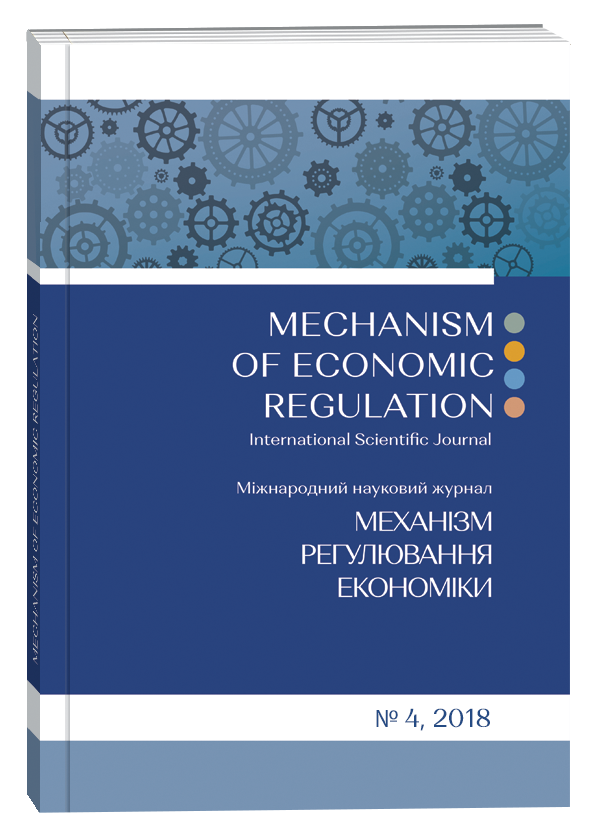ЕКОНОМІЧНА ТА ЗАКОНОДАВЧА ПОЛІТИКА ЄС ДЛЯ СТИМУЛЮВАННЯ ТРЕТЬОЇ ТА ЧЕТВЕРТОЇ ПРОМИСЛОВИХ РЕВОЛЮЦІЙ
Анотація
У статті аналізуються соціально-економічні та юридичні механізми забезпечення третьої та четвертої промислових революцій, з урахуванням досвіду ЄС. В роботі обґрунтовано причини виникнення третьої та четвертої промислових революцій; представлено огляд сучасних способів виробництва, економічних відносин, побуту людини, основних потреб та професій, а також багатьох інших атрибутів життя, спричинених третьою та четвертою промисловими революціями. Ці перетворення вимагають формування та прийняття відповідних законів та директив, які вже діють в ЄС. У статті пояснюється, які юридичні інструменти допомагають забезпечити третю та четверту промислові революції. У статті викладена законодавча база формування сестейнового транспорту, агровиробництва та будівництва. В роботі досліджено досвід ЄС щодо створення загальноєвропейського транспортного простору та проаналізовано результати різкого зниження негативних екологічних ефектів транспорту та досягнення до 2050 року скорочення викидів парникових газів на 60 %. В статті пояснюються наслідки повної заборони до 2050 року використання автомобільного транспорту на таких видах палива, як бензин, дизельне паливо та інші вуглецеві види палива, що в свою чергу буде сприяти забезпеченню зеленої економіки та досягнення цілей сестейнового розвитку. Проаналізовано ефекти сестейнового агровиробництва, що об'єднує три основні цілі – екологічне здоров'я, економічну прибутковість та соціально- економічну рівноправність. У статті розглядаються проблеми розвитку сестейнових поселень, створення життєблагодатного середовища для забезпечення здорового існування людини та її розвитку, включаючи соціальний розвиток, а також мінімізацію негативного впливу на природні системи процесів створення та функціонування самих поселень.
Посилання
Weizsäcker, E. (2013). Faktor pyat’. Formula ustoichivogo rosta. Doklad Rimskomu klubu [Factor five. The formula for sustainable growth: report of the Club of Rome]. AST-PRESS KNIGA.
Darguzhite, Zh. (2011). Belaya kniga transportnoy politiki YES vyzov dlya pe-revozchikov? [White Paper on EU Transport Policy Challenge for Transporters?]. Retrieved from http://www.cargonews.ua/aktualii/belaya-kniga-transportnoy-politiki-es-vyzov-dlya-perevozchikov/.
Melnyk, L. G. (2016). Teoriya razvitiya sistem [Systems Development Theory]. Saar Brücken, Germany: Palmarium Academic Publishing.
Nazarov, D. (2016). Chetvortaya promyshlennaya revolyutsiya: Internet veshchey, tsirkulyarnaya ekonomika i blokcheyn [Fourth Industrial Revolution: Internet of Things, Circular Economy and Blockchain]. Retrieved from http://www.furfur.me/furfur/changes/changes/216447-4-aya- promyshlennaya-revolyutsiya.
«Umnyy» dom proizvodit v 2 raza bol'she energii, chem potreblyayet [A “smart” home produces 2 times more energy than it consumes]. Retrieved from https://ecotechnica.com.ua/arkhitektura/478- b10-umnyj-dom-proizvodit-v-2-raza-bolshe-energii-chem-potreblyaet.html.
Buildings (2018). Retrieved from https://ec.europa.eu/energy/en/topics/energy-efficiency/buildings.
Directive (EU) 2018/2001 of the European Parliament and of the Council of 11 December 2018 on the promotion of the use of energy from renewable sources (Text with EEA relevance) (2018). Retrieved from https://eurlex.europa.eu/legalcontent/EN/TXT/uri=uriserv:OJ.L_.2018.328.01.0082.01.ENG&toc=OJ:L:2018:328:TOC.
Directive (EU) 2018/844 of the European Parliament and of the Council of 30 May 2018 amending Directive 2010/31/EU on the energy performance of buildings and Directive 2012/27/EU on energy efficiency (Text with EEA relevance). (2018). Retrieved from https://eur-lex.europa.eu/legal- content/EN/TXT/?toc=OJ%3AL%3A2018%3A156%3ATOC&uri=uriserv%3AOJ.L_.2018.156.01.0 075.01.ENG.
Dufva, T., Dufva, M. (2018). Grasping the future of the digital society. Retrieved from https://doi.org/10.1016/j.futures.2018.11.001.
Industry 4.0. Retrieved from http://en.m.wikipedia.org/wiki/Industry_4.0.
Galindo-Martína, Miguel-Ángel, Castaño-Martínezb, María-Soledad, Méndez-Pica, María-Teresa (2018). Digital transformation, digital dividends and entrepreneurship: A quantitative analysis. Journal of Business Research. Available 14.12.2018.
Kabat, P. (2016). Working in concert for a sustainable future. Making the change. Options, Luxemburg: IIASA.
Legislative proposal (2018). Retrieved from https://ec.europa.eu/info/food-farming-fisheries/key- policies/common-agricultural-policy/future-cap_en.
Proposal for a Regulation of the European Parliament and of the Council Establishing a Programmer for the Environment and Climate Action (LIFE) and repealing Regulation (EU) No 1293/2013 (2018). Retrieved from https://eur-lex.europa.eu/legal- content/EN/TXT/?uri=COM%3A2018%3A385%3AFIN.
Schwab, K. (2016). The Fourth Industrial Revolution. Geneva: World Economic Forum.
Schwab, K. & Davis, N. (2018). Shaping the Future of the Fourth Industrial Revolution. Geneva: World Economic Forum.
Transport 2050: Commission outlines ambitious plan to increase mobility and reduce emission (2011). Retrieved from http://europa.eu/rapid/press-release_IP-11-372_en.htm.
Transport 2050: The major challenges, the key measures (2011). Retrieved from http://europa.eu/rapid/press-release_MEMO-11-197_en.htm.
3 ways the Fourth Industrial Revolution is disrupting the law (2018). Retrieved from https://www.weforum.org/agenda/2018/04/three-ways-the-fourth-industrial-revolution-is-disrupting- law/.
White paper 2011. European Commission. Mobility and Transport / European strategies. Retrieved from https://ec.europa.eu/transport/themes/strategies/2011_white_paper_en.


